Textile portraits bring visibility to queer and trans communities
LJ Roberts’ solo exhibition of embroidered portraits at the Cantor Arts Center illustrates how politics, culture, and identity manifest in visible and subtle ways.
On the second floor of the Cantor Arts Center, in the Lynn Krywick Gibbons Gallery, are 26 diminutive but evocative embroidered portraits by the visual artist and writer LJ Roberts. The solo exhibition titled Carry You With Me: Ten Years of Portraits is the result of an ongoing project by Roberts to create handstitched 4-by-6-inch embroidered images of friends, collaborators, and lovers in New York’s queer and trans communities. The portraits illustrate how politics, culture, and identity manifest in visible and subtle ways in daily life.
Carry You With Me is on view through Nov. 27, 2022.
Roberts’ work investigates overlaps of queer and trans politics, activism, protest, and craft.
Best known for large-scale textile works, the artist, who uses they/them pronouns, spent up to a year on each of the 26 miniature portraits, stitching them intermittently out of a tote bag on the subway, at the beach, in cars, and on planes. “One of the central tenants of my practice is the belief that working in textiles mirrors the flexibility and resilience that often permeates queer and trans survival and thriving,” writes Roberts. “The embroideries demonstrate that art centering kinship, persistence, and connection can be made anywhere at any time.”
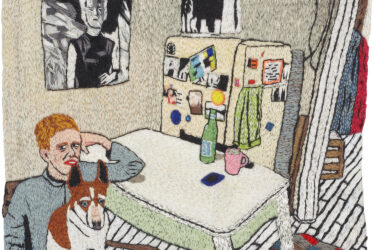
Image credit: Courtesy the artist and Hales, London and New York. Copyright LJ Roberts

Image credit: Johnna Arnold
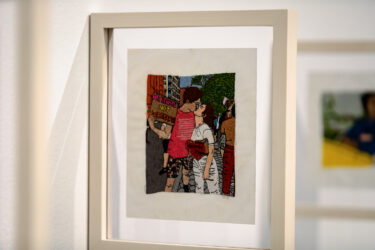
Image credit: Trever Tachis

Image credit: Trever Tachis

Image credit: Courtesy the artist and Hales, London and New York. Copyright LJ Roberts

Image credit: Johnna Arnold

Image credit: Courtesy the artist and Hales, London and New York. Copyright LJ Roberts

Image credit: Trever Tachis
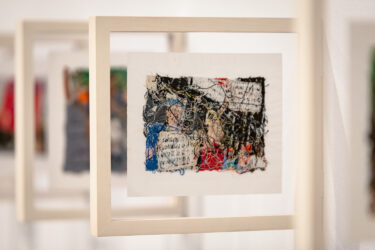
Image credit: Trever Tachis
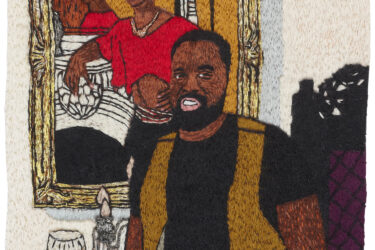
Image credit: Courtesy the artist and Hales, London and New York. Copyright LJ Roberts
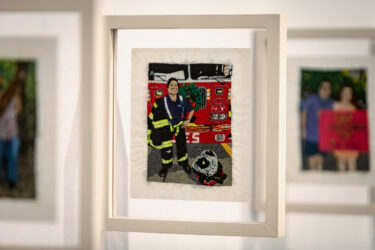
Image credit: Trever Tachis

Image credit: Trever Tachis
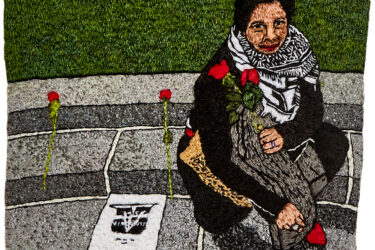
Image credit: Courtesy the artist and Hales, London and New York. Copyright LJ Roberts
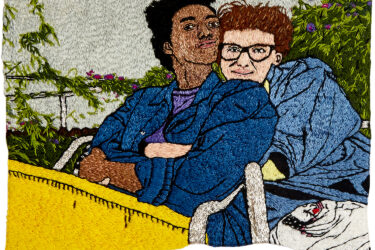
Image credit: Courtesy the artist and Hales, London and New York. Copyright LJ Roberts
The title of the exhibition is a reference to the tote bag that Roberts carried while working on the portraits and the companionship they felt for the people whose images they were stitching.
In a published conversation in the catalog accompanying the exhibition, art historian and Stanford alum Tirza True Latimer, PhD ’03, professor emerita at the California College of the Arts, asked Roberts about their attraction to the genre of portraiture. Roberts admitted that while such traditional representation has limitations, “there is the question of visibility and its importance, which I recognize, and which has been critical in understanding and growing my own self.”
That visibility that manifests in the exquisite articulation of facial expressions, clothing, jewelry, and the sitters’ environments belies the chaotic and abstract network of visible threadwork on the back of the portraits.
The embroideries are framed between glass and hinged to the wall allowing the viewer to see the woven and knotted threads on the back, an abstract record of the process that is as important as the facing side, said Roberts. “It’s the same portrait, and, I think, that’s the poetry of it.”
Nov. 20 is Transgender Day of Remembrance, commemorating the lives of transgender and gender non-conforming people that have died by violence rooted in bigotry and intolerance.